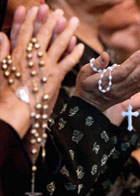Christianity in the Middle East

Pope Benedict XVI's visit to Cyprus on Sunday was marred by events that cast their own, baleful light on the purpose of his mission: to unveil a Vatican position paper on the deteriorating condition of Christianity in the Middle East. Hours before his arrival, one of the document's authors, Bishop Luigi Padovese, the apostolic vicar of Anatolia, was murdered by his "mentally unstable" driver. Padovese had only recently met with Turkish authorities to discuss the problems of that country's tiny Christian minority—and had previously extended Christian forgiveness to a Muslim youth who in 2006 murdered a Catholic priest. Three more Turkish Christians were murdered in their Bible publishing house in 2007.
The draft document, "The Catholic Church in the Middle East," exemplifies the tightrope walked by the Vatican with regard to the ever-worsening circumstance of Christianity in the region. Worried about the dwindling indigenous communities of Christian Arabs and about newly arriving Christian workers from Asia, but with an eye to Islamic sensibilities, the paper artfully cites Israel's "occupation of Palestinian territories" as harming Christian Arabs no less than their Muslim compatriots. In its Italian-language version, as the New York Times points out, the document goes further, explicitly warning against the use of the Bible "to justify the political injustice imposed on the Palestinians." In this same connection the Church also thoroughly dissociates itself from "certain Christian fundamentalist theologies"—in other words, Christian Zionism with its unstinting support of Israel.
But the heart of the document—cushioned by its de-rigueur genuflecting to the Palestinian cause—is the assertion that "Oftentimes, relations between Christians and Muslims are difficult, principally because Muslims make no distinction between religion and politics, thereby relegating Christians to the precarious position of being considered non-citizens." "Too often," it hastens to add, Muslims mistakenly identify Christianity with the West—even though "modernity" also poses risks to Christians. Finally, the Church warns against active Christian proselytizing among Muslims.
Early in his papacy, at Regensburg in Germany, Benedict quoted an "erudite Byzantine emperor" talking with "startling brusqueness" about Islamic religious violence. If his intention then was to engage Muslims in vigorous but reasoned polemical disputation, it failed; many of his hoped-for interlocutors reacted with rage, some by killing Christians and burning churches. Four years later, the tone of "The Catholic Church in the Middle East" suggests an abandonment of any claims to religious rights and justice in favor of a plea for Muslim forbearance.
Comments are closed for this article.





The Project is called "The Memorial Hall at the Church of the Nativity."
I have been involved in this project ever since its inception.
Those interested can visit the website at www.nativityhall.com (still under construction but worth the visit to learn more on the subject) and www.nativityhall.net, among others.
Helen Kariv